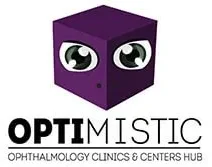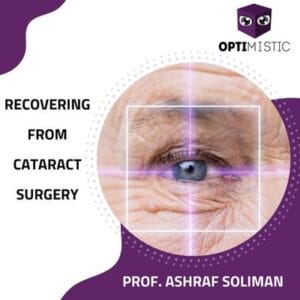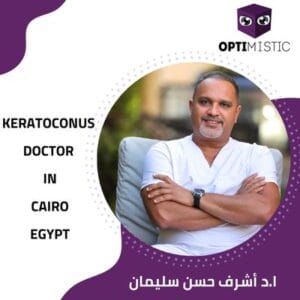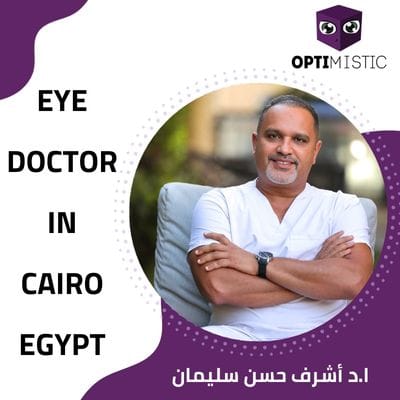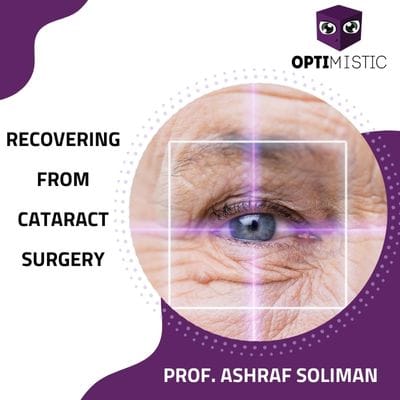best lasik doctor in cairo egypt – Doctor Ashraf Soliman
Who is the Best LASIK Doctor in Egypt?
Professor Ashraf Hassan Suleiman is considered one of the best LASIK doctors in Egypt. He is a consultant and professor of ophthalmology at the Faculty of Medicine, Ain Shams University. Dr. Ashraf Suleiman is also one of the most experienced ophthalmologists in Egypt and the Arab world, specializing in cosmetic eye surgeries and the treatment of vision problems using advanced techniques such as femtosecond laser, femto-SMILE, and customized LASIK. He also provides treatment for glaucoma, cataracts, and performs corneal transplantation surgeries, which are among the most delicate procedures in the world.
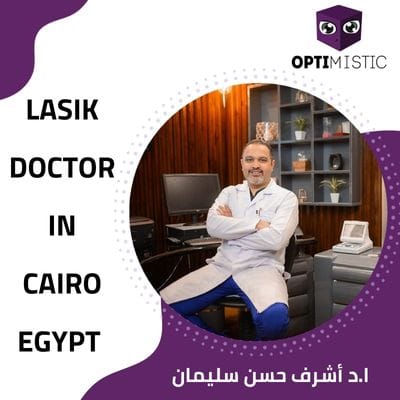
Why is Dr. Ashraf Hassan Suleiman the Best LASIK Doctor in Egypt?
Dr. Ashraf Suleiman is recognized as one of the leading eye surgeons in Egypt, especially in cataract and LASIK surgeries, due to his expertise and outstanding success rates. He always ensures the use of the latest global technologies, including custom LASIK, femto-LASIK, detailed LASIK, and advanced cataract treatments.
Some of his key highlights include:
One of the top consultants in ophthalmology and refractive eye surgery, with extensive experience in cataract surgeries, laser vision correction, and intraocular lens implantation.
He earned his PhD in Ophthalmology from Ain Shams University in 2009, where he later became a lecturer and then an associate professor in 2019. Today, he holds the position of Professor of Ophthalmology at Ain Shams University.
Consultant of corneal surgeries, cataract surgeries, and laser vision correction.
Member of several prestigious international medical associations in ophthalmology and refractive surgery.
Fellow of the Royal College of Ophthalmologists, UK.
Fellow of the International Council of Ophthalmology.
He has published numerous research papers in international peer-reviewed journals, making him one of the most distinguished LASIK surgeons in Egypt. Moreover, he is an active member of the American Academy of Ophthalmology and the European Society of Cataract and Refractive Surgeons.
Advanced Techniques Used by the Best LASIK Doctor in Egypt
Dr. Ashraf Suleiman adopts the most advanced devices and laser technologies in eye surgery, including:
Surface laser (PRK)
Contoura Vision
Custom LASIK
Femto-LASIK
Femto-Custom LASIK
Femto-SMILE
These procedures provide highly effective results for treating refractive errors such as myopia, hyperopia, and astigmatism.
Types of Vision Correction Surgeries
Vision correction and LASIK surgeries are among the most common eye procedures worldwide. They help patients get rid of eyeglasses and contact lenses. Below are the main types performed by Dr. Ashraf Suleiman:
LASIK Surgery (Traditional LASIK)
This is the oldest form of laser eye surgery. The cornea is reshaped to correct refractive errors such as nearsightedness, farsightedness, and astigmatism. It offers quick recovery, precise results, and minimal pain. However, it may not be suitable for all patients.
PRK (Photorefractive Keratectomy)
PRK is an alternative to LASIK for patients who cannot undergo traditional LASIK. The epithelial layer of the cornea is removed before laser treatment. Recovery takes longer than LASIK and may involve discomfort in the first few days.
Femto-LASIK
This is an advanced version of LASIK where a femtosecond laser is used instead of a surgical blade to create a thin corneal flap. It is more precise, safer, and reduces complications.
SMILE (Small Incision Lenticule Extraction)
SMILE is a minimally invasive laser eye surgery that uses femtosecond laser to reshape the cornea through a very small incision. It causes less dryness and offers a faster recovery. However, it is more costly and may not be suitable for all refractive errors.
Intraocular Lens Implantation (IOL / ICL)
For patients not eligible for laser surgeries, intraocular lenses are implanted. These include monofocal and multifocal lenses. Implantable Collamer Lens (ICL) can also be used for patients under 40 with high myopia or astigmatism.
Cost of LASIK Surgery in Egypt
The cost of LASIK surgery in Egypt varies depending on the technique used, the surgeon’s expertise, and the medical center. On average, the price of LASIK in Egypt starts from 8,000 EGP and may reach up to 20,000 EGP for advanced procedures such as femto-SMILE or customized LASIK.
Factors affecting LASIK costs include:
The type of laser technology used (LASIK, PRK, Femto-LASIK, SMILE).
The surgeon’s qualifications and years of experience.
The medical center or hospital facilities.
Whether the surgery is performed on one eye or both eyes.
Additional examinations or follow-up visits required.
Although prices in Egypt are relatively lower than in Europe or the Gulf countries, patients still receive world-class medical care using the latest international technologies.
Success Rates of LASIK Surgery in Egypt
LASIK surgeries performed by top specialists in Egypt, including Professor Ashraf Hassan Suleiman, achieve success rates exceeding 95%. Patients usually experience significant improvement in vision within 24 hours, and many achieve 20/20 vision or better without glasses.
Success depends on several factors, such as:
Proper pre-operative assessment and tests.
The patient’s age and eye health.
Choosing the appropriate LASIK technique for the patient’s condition.
Following post-operative instructions carefully.
Who is Eligible for LASIK Surgery?
LASIK surgery is suitable for many patients, but not everyone. The best LASIK doctor in Egypt, Dr. Ashraf Suleiman, emphasizes the importance of detailed medical examinations before surgery.
You may be eligible for LASIK if:
You are over 18 years old with stable vision for at least one year.
You suffer from myopia, hyperopia, or astigmatism.
Your corneal thickness is sufficient for the procedure.
You have healthy eyes with no major conditions such as glaucoma or severe dry eye.
You may not be eligible if you:
Have keratoconus or severe corneal thinning.
Suffer from advanced eye diseases.
Are pregnant or breastfeeding.
Have unstable vision that continues to change.
Pre-Operative LASIK Examinations
Before undergoing LASIK, the patient must complete a set of diagnostic tests to determine suitability. These tests include:
Visual acuity measurement.
Corneal thickness assessment (pachymetry).
Corneal topography to check shape and curvature.
Tear film evaluation to detect dryness.
Eye pressure measurement to rule out glaucoma.
These tests help the surgeon decide the safest and most effective procedure for each patient.
Instructions Before LASIK Surgery
Patients should follow specific guidelines before undergoing LASIK:
Stop wearing contact lenses (soft lenses for at least 2 weeks, hard lenses for 3–4 weeks).
Avoid using eye makeup for at least 24 hours before surgery.
Do not use perfumes or lotions on the day of the procedure.
Arrange for someone to accompany you after surgery, as you cannot drive.
Post-Operative Care After LASIK
Recovery after LASIK is usually quick, but following instructions ensures the best outcome:
Use prescribed eye drops (antibiotic, anti-inflammatory, and lubricating).
Avoid rubbing your eyes.
Do not swim or expose your eyes to dust or smoke for at least 2 weeks.
Avoid strenuous exercise or contact sports for a month.
Wear sunglasses to protect from bright light.
Most patients can return to work within 2–3 days after the procedure.
Possible Side Effects of LASIK
Although LASIK is considered safe, some patients may experience temporary side effects, such as:
Dry eyes.
Light sensitivity.
Mild eye irritation.
Halos or glare at night.
Fluctuations in vision during the first few weeks.
In most cases, these symptoms improve gradually and resolve completely with proper care.
Why Choose Dr. Ashraf Hassan Suleiman for LASIK Surgery?
Over 15 years of experience in eye surgery and vision correction.
Professor of Ophthalmology at Ain Shams University.
Fellow of the Royal College of Ophthalmologists, UK.
Member of the American Academy of Ophthalmology and the European Society of Cataract and Refractive Surgery.
High success rates and thousands of successful LASIK procedures performed.
Uses the latest laser technologies available worldwide.
